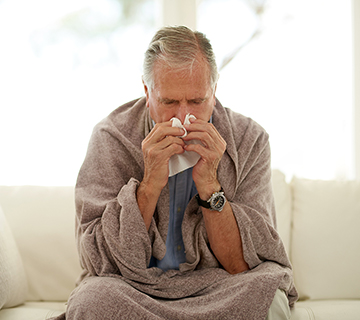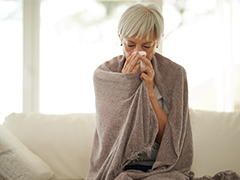Everything You Need to Know About the Flu

It might seem early, but the sooner you plan for flu season the better—it’s easy to put it off until winter when you’re most at risk.
What is the flu?
It’s an infection that’s caused by different viruses every year. It shouldn’t be confused with the common cold, which isn’t as severe and its symptoms show up slower. Colds also typically don’t cause fevers or headaches.
Is it contagious?
It’s very contagious. If someone with the virus breathes, sneezes or coughs, the virus can go into the air and onto surfaces. It can be passed to you by breathing it in or getting it on your hands and touching your face.
What are the symptoms?
- Fever
- Headache
- Muscle aches
- Coughing
- Sore throat
- Tiredness
- Runny or stuffy nose
- Chills
- Nausea
- Vomiting
Symptoms are typically gone after about 5 days but can last over a week in some cases. If you think you have the flu, you should see your doctor to get checked out. If you’re too sick to make it to the doctor’s office, try using telehealth services.
Should you get vaccinated?
Yes, it’s one of the best ways to fight the flu. Almost everyone over 6 months old should get it unless they’re allergic or have certain medical conditions. If you’re unsure if you’re at risk, ask your doctor if you’re able to get a vaccination.
The virus changes year to year, so a new shot is needed annually to ensure your body is protected. Be sure to get it done before the end of October because it takes about two weeks to take effect. As an FEP member, your flu shot counts as preventive care, meaning you pay nothing for year-round protection.
Contrary to popular belief, the vaccine can’t give you the flu. It’s worth noting that it doesn’t guarantee you won’t get the flu, but it helps keep your symptoms mild if you happen to get sick.
How else can you prevent it?
Besides vaccination, there are a few things you can do to prevent yourself from getting sick. Wash your hands often with plenty of soap or use hand sanitizer when soap isn’t around. Cleaning frequently touched surfaces like doorknobs, tables and phones is a good idea. Lastly, try not to touch your face because your eyes, nose and mouth are the easiest places for the virus to infect you.


